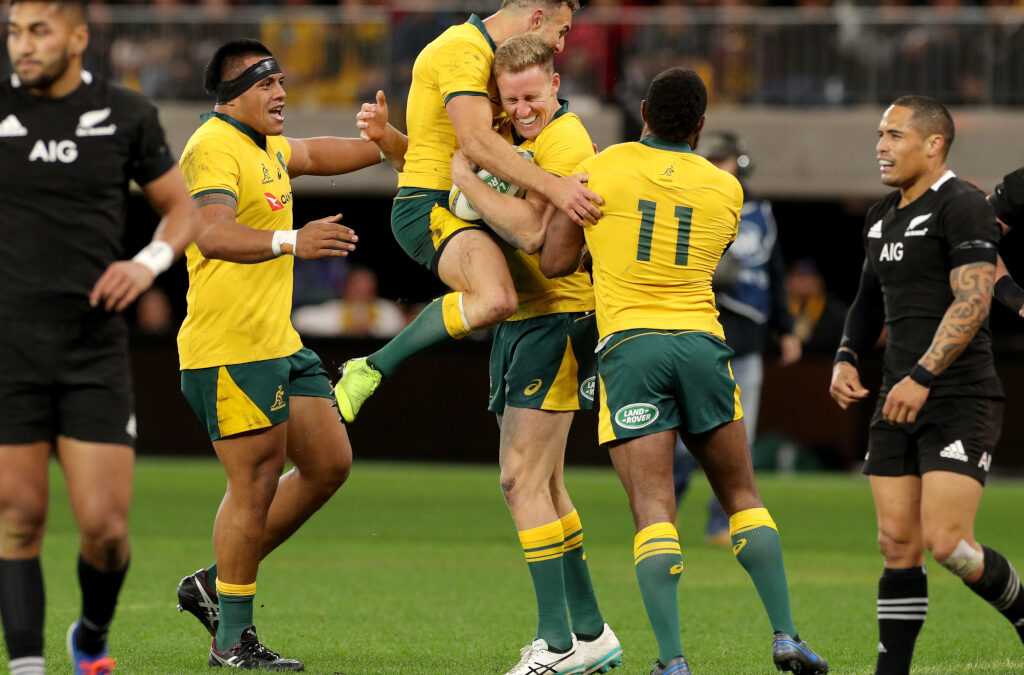It’s happening. Rugby Australia has voted to proceed with securing private equity for the game.
But there is a sting in the tail, with RA chairman Hamish McLennan linking the states’ support of constitutional reform to what could prove to be one of the most significant financial transactions in Australian sport.
“The RA board met last week and has approved a pathway forward to private equity proposals,” McLennan told The Australian. “We are tidying up a few loose ends with potential advisers and this will have the potential to chart an incredibly exciting period for rugby in Australia.”
Although private equity deals have become fairly standard in European rugby — with CVC Capital Partners holding a stake in England’s Premiership and the Pro14 provincial competition and still in protracted talks with the Six Nations over a reported 14.5 per cent share in that tournament — it is a form of funding that remains largely unexplored territory in Australia.
Potentially, it could bring unprecedented wealth into the game and opens the door to IP and financial clout beyond the imagination of Australian rugby officials down the decades. The downside is that their new private equity partners, whoever they are, will make no secret of their intention to increase the value of their share with a view to selling it down the track.
It is unclear at this point whether RA will seek to sell only the Super Rugby component of its business or whether it might emulate the New Zealand Rugby and consider a whole-of-business approach. In the case of the Kiwis, the United States investment company Silver Lake has tabled an offer of US$330 million ($429m) to acquire 15 per cent of NZR’s commercial rights.
“We will do what is right for us,” McLennan said.
Given how fluid RA remains going into this process, it is impossible to say how money might be gained by taking on a private equity partner. Certainly RA has no expectations of matching what the NZR will potentially receive if the deal proceeds – especially since its arrangement with Silver Lake includes the All Blacks, whereas RA might or might not cordon off the Wallabies.
Nor has it been established which firm it will choose to do business with. The UK’s Sky News has reported that Silver Lake was vying with CVC Capital Partners and Bruin Sports Capital for the New Zealand contract and McLennan has indicated that the same players involved across the ditch – and others – have already approached RA.
Silver Lake’s has reported assets under management of US$40 billion ($52bn) but there may well be a rival player with far closer ties to Australian rugby who may yet play a very significant role in the process, Andrew Forrest.
“He has that twinkle in his eye and I am sure he will have a swing,” McLennan observed.
With Forbes magazine estimating Forrest’s wealth at $27.5bn, he certainly has the clout to help shape events, and not just on the financial front. He still seethes over the fact that his beloved Western Force was culled from Super Rugby in 2017 by “decision-makers in the east” and while circumstances have now changed and the Force has returned, Forrest has not stopped campaigning for RA to sort out its messy constitution.
In that regard, he holds similar views to McLennan. The new chairman – and he still qualifies as “new” given that he took over the role just 10 months ago – has spearheaded a lot of changes during his time in office but he has made no secret that he hopes constitutional reform will be seen as his most lasting contribution to the sport.
He is frustrated by a federalist document that he believes is holding back the sport. “It’s a major impediment to getting the sport firing,” he said.
As a result, he looks like playing hardball with the new money that he intends bringing into rugby. “The dispersal of funds will be tied to very-much needed constitution change across the code. It is critical we get constitution change.”
How does that change look in McLennan’s eyes? “I like an AFL-style commission. It makes sense and if we can improve on that, then well and good.”
Inevitably, “constitutional reform” is largely seen as a reining of the two states which have always held the power in Australian rugby, NSW and Queensland. That dominance might be a reflection of the historic reality that, together, they produce around 80 per cent of Australia’s playing strength. Still, despite having first crack at home-grown talent, NSW currently is lingering at the bottom of the Super Rugby AU ladder, winless after three competition games.
There is no way, under the terms of its own constitution, that RA is able to intervene in the Waratahs’ dire situation. It matters not that NSW is an integral part of RA’s own business and that the waves of disgruntlement at its current dismal form are spreading out across the game, threatening to swamp everyone. All McLennan is allowed to do is to offer vague encouragement.
“All teams go through cycles and the Waratahs are world-famous with an incredible rugby history and they will come back,” he said. “At this point, I think the (NSWRU) organisation needs to go through a period of introspection.
Interpret that how you will.
He is convinced, however, that “everyone will be a winner” out of going down the private equity route and that not only will rugby secure adequate funding for sustainable growth but that there will be an “endowment” to carry the game into the future.
With luck, that future should be a vast improvement on the recent past. As South African Rugby chief executive Jurie Roux once said, private equity investment would essentially show that rugby hasn’t been doing its job well enough. That certainly applies to Australian rugby, curiously so given its ready access to the Big End of Town. Arguably, that may be about to change.
Private equity won’t just bring capital. It will bring capability. And that’s a quality Australian rugby has been lacking for too long.
Source: The Australian
Can’t stop reading? Read more
Carlyle and Goldman Sachs open private credit funds to Willow users with $10,000 minimum
Carlyle and Goldman Sachs open private credit funds to Willow users with $10,000 minimum Carlyle,...
EQT, PAI, and Stone Point shortlisted for €2bn takeover of Castik-backed Global Group
EQT, PAI, and Stone Point shortlisted for €2bn takeover of Castik-backed Global Group EQT, PAI...
CAIS Advisors unveils retail vehicle giving investors a stake in elite sports and media
CAIS Advisors unveils retail vehicle giving investors a stake in elite sports and media Eldridge...




